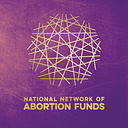“Hi y’all. I’m still pretty rankled about the election results.” wrote Athens, Georgia resident Madeline Dahl in a Facebook post on November 13th, “Any tips I receive from smarmy Trump folks are going straight to the Magnolia Fund.”
This was the first of several posts she made about her decision to redistribute some of her tips made waitressing to our fund. Folks responded enthusiastically, and soon 200 servers, bartenders, cooks and bouncers across a couple dozen businesses decided to join her in a month-long giving circle. Dahl began to imagine a sustaining effort.
“I’m starting a monthly fundraiser to gather contributions for organizations that represent folks further threatened by a Trump presidency. Every 9th of the month, contributions will go to a previously designated organization in the Athens area. Any contributions — small or big — are most welcome.”
She named the group 86 Hate, an allusion to the industry term for nixed menu items.
“As servers [and service industry professionals] ourselves, we also know the struggle of living from shift to shift,” Dahl says, “I always suggest folks donate the value of a High Life.” In our town, a High Life costs $2.
Athens straddles several ecosystems, each as deeply Southern as they are disparate. Nestled below the Appalachian foothills and surrounded by rural areas, its home county Athens-Clarke is both one of the poorest in the state and home to the University of Georgia, endowed with over $1 billion. As you’d expect, gentrification and segregation are visible struggles in our community.
Magnolia Fund was founded in here in 2011. There is no local abortion clinic, but there are several an hour and a half west in Atlanta and its surrounding counties, and a few others scattered across the state in places like Augusta and Savannah (Magnolia Fund is now dually based in Athens and Atlanta). This means that Magnolia’s work has, from the beginning, required intensive practical support. Specifically, counseling and funding for callers for things like transportation and childcare to get to one of these cities is almost as regularly required as funding for procedures themselves.
Building a base in Athens is difficult and easy. A blue dot in a red sea, stirring residents to action in a small, often vocal and intimate community is a joy. There’s a richness in art and music and soul food. With lower rent than the national average, several large higher educational institutions and an accelerating rate of gentrification, it is also home to an unusually transient population. Unsurprisingly, career opportunities are rare and work in the service industry is the second most common occupation.
That’s what makes 86 Hate a quintessentially “Athens” coalition, and there is power in this shared experience. In addition to “galvaniz[ing] the local service industry to support and donate to organizations that do crucial work in the Athens area,” Dahl says, “we advocate for the rights of our diverse service industry employees and aim to serve their needs.”
Unions aren’t legal in Georgia, so 86 Hate can’t become one officially. But they can and are uniting to reimagine how our economies move and, through this new action, beginning a conversation about what a better Athens might look like.
Madeleine and local bartender Indy Swink organized three ways for folks to participate: a running opportunity for Venmo transfers, glass jars for a particularly satisfying immediate cash-stash from the tips of rambunctious (or fabulous!) customers, and a donation drop-off in an Athens downtown bar once a week. Swink puts drop-off donations in labeled envelopes and pins them to a bulletin board behind the bar. Members of their group can see who else is participating over a beer or a snack.
“It’s very driven by what people are able to give: what you can, when you can. [Our] model [aims to] take pressure off of people who usually have to be pretty thrifty with their cash.” Servers have also come up with their own fundraising tactics based on respective workplace cultures, like tip percentage nights and matching-donations.
The model facilitates easy participation and engagement in community healing for folks that are often overworked, with little free time. “People don’t have to feel powerless just because they can’t do grand political acts,” says Dahl, “But donating to organizations once a week or once a month that do the social justice work you want in your community can be your political act, your vote of support.”
After a month of tips-collecting, 86 Hate hand-crafted a big novelty check, complete with gold and pink glitter, and presented $1000 to Magnolia Fund. We were in a local bar where many Athenians gathered to watch the presidential debates and election results, and we felt so held. Obviously, we cried. As any abortion funder can attest, the holidays are a tough time and call volume is way up. We are completely floored by the simple ingenuity and generosity of this new coalition, and eager to watch them grow.
Next month, 86 Hate will be collecting tips and donations for an organization near and dear to our hearts: the Young Urban Farmers. The YUF program is a paid opportunity for local high school students to farm, cook and sell their wares in and for their own communities at the Athens West Broad Farmers Market. If you’re interested in collaborating with 86 Hate to model a similar circle in your own community, you can contact them here: eightysixhate@gmail.com
Prosper Hedges is a board member for Magnolia Fund, co-editor of The Tinkypuss Zine and instructor with Girls Rock Athens.
